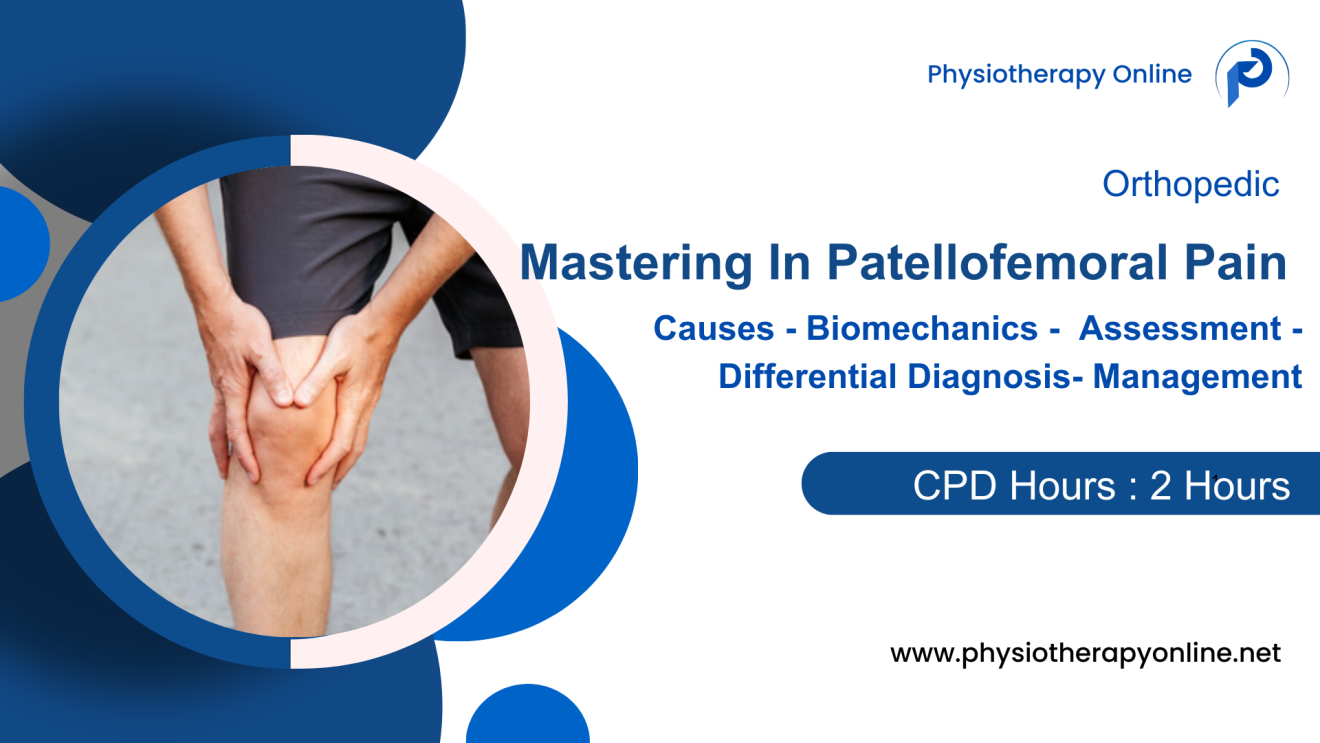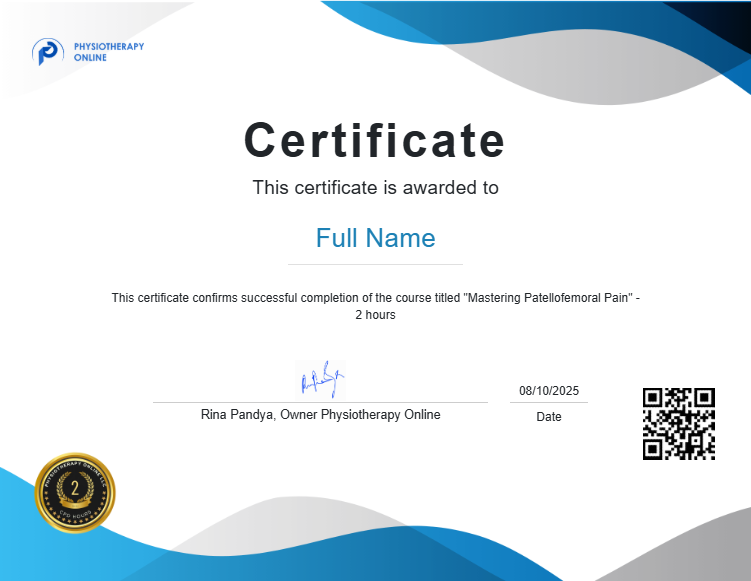About Course
Patellofemoral pain is the most common type of anterior knee pain and presents in many ways. This series of online modules will focus on expert assessment of the anterior knee and how to develop tailored treatment plans. We will present ways to identify patient specific drivers with tools that can be easily adopted into your clinical practice.
There is so much more to managing patellofemoral pain than VMO exercises and patellar taping. There is no place for a one-size-fits-all approach, and we will provide you with a greater ability to assess and treat people with patellofemoral pain. Most importantly, this course will provide you with practical and clinically applicable skills that can be used the very next time you see a patient.
Develop, improve, and tailor your approach to the assessment and management of individuals with patellofemoral pain.
Curriculum of Online Physiotherapy Course on PFP
By the end of these modules, you will be able to;
Lecture 1 – Epidemiology of PFP
- Define PFP
- Describe the incidence and prevalence of PFP in differing populations
- Understand which variables are associated with the development of PFP
Lecture 2 – Variables associated with PFP: structure and biomechanics
- Recognise structural and biomechanical variables associated with PFP persistence
- Understand how structural and biomechanical variables affect prognosis
Lecture 3 - Variables associated with PFP: physical activity and psychology
- Recognise physical activity and psychological variables associated with PFP persistence
- Understand how physical activity and psychological variables affect prognosis
Lecture 4 – Assessing the anterior knee: part 1
- Understand the rationale for assessing an individual with PFP
- Identify the important factors when assessing an individual in pain
- Describe how to diagnose PFP
Practical 1 – Ruling in PFP
- Perform clinical examination to rule out differential diagnoses and rule in PFP
Lecture 5 – Assessing the anterior knee: part 2
- Describe the deficits that can be identified through clinical assessment
- Communicate the assessment findings to a person with PFP
Practical 2
- Identifying deficits
2. Perform a clinical assessment to identify deficits associated with PFP
Lecture 6 – Adjuncts for PFP
- Describe the adjuncts that can be used for managing PFP
- Identify people with PFP that are more likely to benefit from specific adjuncts
- Describe the adjuncts that should not be used for managing PFP
Lecture 7 – Exercise interventions for PFP
- Explain why the evidence supports exercise interventions for PFP
- Describe how exercises interventions can effect pain and function
- Understand how exercise interventions are best delivered
Lecture 8 – Running retraining for PFP
- Explain why running retraining may be effective for people with PFP
- Describe the sub-group of people with PFP who are more likely to benefit from running retraining
- Understand which retraining cues are most appropriate
Lecture 9 – Load management in PFP
- Recognise people with PFP who have a load management issue
- Deliver load management strategies in people with PFP
- Understand how to integrate load management strategies into a comprehensive management plan
Authors:
Dr Bradley Neal, PhD

Orchid ID: https://orcid.org/0000-0003-0651-3758
I completed my MSc at the University of Hertfordshire in 2011, followed by my PhD at Queen Mary University of London (QMUL) in 2019. My PhD thesis was entitled 'the influence of lower limb biomechanics on the development, persistence and management of patellofemoral pain in recreational runners'.
I spent 10 years as a Specialist Musculoskeletal Physiotherapist at Pure Sports Medicine,London’s leading private Sports Medicine clinic, where I also acted as the company's Head of Research.
In April 2021, I joined the School of Rehabilitation and Exercise Science at the University of Essex as a Lecturer (Education and Research) in Physiotherapy. I am also a post-doctoral Research Fellow in Sports & Exercise Medicine at QMUL and a Visiting Lecturer at the University of Hertfordshire, contributing to their post-graduate physiotherapy programme.
I have published in several leading peer-reviewed journals, including the British Journal of Sports Medicine, Gait & Posture and Physical Therapy in Sport, where I am also an editorial advisor. My main research interests are in Patellofemoral Pain and other knee pathologies, biomechanics, running-related injury and the epidemiology of musculoskeletal conditions
Dr Simon Lack, PhD
ORCID ID: https://orcid.org/0000-0003-1732-9606

I completed my Physiotherapy BSc at Brunel University in 2005, followed by my MSc in Sports & Exercise Medicine at Queen Mary University of London (QMUL) in 2011, and have been building my clinical academic career ever since. I completed my PhD in 2017, with a thesis entitled 'the interaction of hip and foot biomechanics in the development and management of patellofemoral pain'.
I have continued to work clinically throughout my academic career as a Specialist Musculoskeletal Physiotherapist at Pure Sports Medicine, where I am also Head of Research. I am also Head of Medical Services for the elite scholarship athlete programme at the University of East London.
I currently lead the MSc in Sports & Exercise Medicine at QMUL, where I aim to combine my clinical and academic experience to help guide the delivery and development of the programme. My main research interests centre on the assessment and delivery of targeted interventions, through a greater understanding of treatment effect mechanisms, for common knee complaints and in particular, patellofemoral pain and patellofemoral osteoarthritis
Disclaimer: Our online physiotherapy courses meet the criteria and guidelines for CPD (Continuing Professional Development). The CPD hours indicated on the certificate contribute towards fulfilling professional standards and requirements necessary for CPD audits conducted by the HCPC and AHPRA. These CPD hours are important for maintaining physiotherapy registration and ensuring compliance with CPD audit and Physiotherapy registration renewal processes. Our courses are recognized as valuable continuing education resources across the UK, Australia, New Zealand, and throughout Asia and the Middle East.


